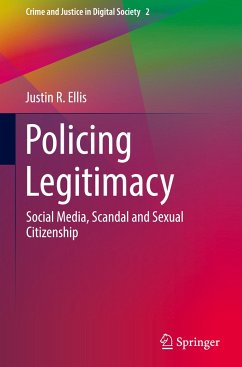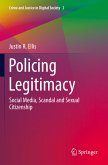This book critically analyses the impact of digital media technologies on police scandal. Using an in-depth analysis of a viral bystander video of police excessive force filmed at the 2013 Sydney Gay and Lesbian Mardi Gras Parade and uploaded to YouTube, the book addresses the ways social media video sousveillance can shape operational and institutional police responses to police misconduct.
The volume features new research on the immediate and longer-term impacts of social media-generated police scandal on police legitimacy and accountability and responds to inherent questions of procedural justice. It interrogates the technological, political and legal frameworks that govern the relationships between the police and LGBTQI communities in Australia and beyond through the 'social media test' - the police narratives created and contested through social media, mainstream media, and police media. In doing so, it considers the role of sexual citizenship discourse as a political, economic and social organizing principle.
A comprehensive and interdisciplinary understanding of 'digital' and 'queer' criminology, this is an essential read for those working at the intersection of criminology and the digital society, queer criminology, and critical criminology.
The volume features new research on the immediate and longer-term impacts of social media-generated police scandal on police legitimacy and accountability and responds to inherent questions of procedural justice. It interrogates the technological, political and legal frameworks that govern the relationships between the police and LGBTQI communities in Australia and beyond through the 'social media test' - the police narratives created and contested through social media, mainstream media, and police media. In doing so, it considers the role of sexual citizenship discourse as a political, economic and social organizing principle.
A comprehensive and interdisciplinary understanding of 'digital' and 'queer' criminology, this is an essential read for those working at the intersection of criminology and the digital society, queer criminology, and critical criminology.
"Ellis frames Policing Legitimacy as a case study in 'digiqueer criminology'. He situates the bystander footage of Jackson Reed's assault as a threshold case of 'sousveillance' - 'watching from below' - and investigates the disruption this practice can make to the instituted relations between media, state and other organisations that typically mediate the accountability of the police to the public." (Kane Race, Alternative Law Journal, August 13, 2023)
"The book lays out the social, cultural, and political significance of sousveillance and its impact on the public's demand that police justify their actions. Ellis' major contribution here is detailing what he describes as the 'social media test,'a 'credibility test of police culture,' where contestation of truth claims perpetually cycle through the multi-media landscape, demanding institutional response, and requiring constant renewal of legitimacy. ... Given our heightened scrutiny of policing in a larger cultural context, Ellis' study is particularly timely and worthwhile." (Nickie D. Phillips, Crime Media Culture, February 22, 2022)
"The major strength-and the core contribution of the book-is its theoretical developments- particularly in relation to police legitimacy ... that emerges from its sophisticated analyses of its rich data. Another highlight is the book's attention to key scholarship by notable international criminologists ... . The book will also serve as a primer for future queer criminology research ... as well as on its innovative 'digiqueer' approach, which will provide a benchmark for further queer scholarship in criminology and beyond." (Christopher J. Schneider, Critical Criminology, January 25, 2022)
"Ellis has produced an authoritative and sophisticated analysis of the play of the significance of new digital technologies for the negotiation of police legitimacy - and how legitimacy may be lost and regained. This is an important contribution to the literature on police/media/public relations as well as advancing theoretical debate through Ellis' 'digiqueer' conceptual approach to explore the impact of digital technologies on public order policing and resistance by minority and marginalised groups, and it lays the foundations for further research in this field. It is a must read for all policing scholars and will be a valuable addition to reading lists for policing courses and modules on crime and the media internationally." (Marianne P. Colbran, Policing and Society, Vol 31 (9), 2021)
"The book lays out the social, cultural, and political significance of sousveillance and its impact on the public's demand that police justify their actions. Ellis' major contribution here is detailing what he describes as the 'social media test,'a 'credibility test of police culture,' where contestation of truth claims perpetually cycle through the multi-media landscape, demanding institutional response, and requiring constant renewal of legitimacy. ... Given our heightened scrutiny of policing in a larger cultural context, Ellis' study is particularly timely and worthwhile." (Nickie D. Phillips, Crime Media Culture, February 22, 2022)
"The major strength-and the core contribution of the book-is its theoretical developments- particularly in relation to police legitimacy ... that emerges from its sophisticated analyses of its rich data. Another highlight is the book's attention to key scholarship by notable international criminologists ... . The book will also serve as a primer for future queer criminology research ... as well as on its innovative 'digiqueer' approach, which will provide a benchmark for further queer scholarship in criminology and beyond." (Christopher J. Schneider, Critical Criminology, January 25, 2022)
"Ellis has produced an authoritative and sophisticated analysis of the play of the significance of new digital technologies for the negotiation of police legitimacy - and how legitimacy may be lost and regained. This is an important contribution to the literature on police/media/public relations as well as advancing theoretical debate through Ellis' 'digiqueer' conceptual approach to explore the impact of digital technologies on public order policing and resistance by minority and marginalised groups, and it lays the foundations for further research in this field. It is a must read for all policing scholars and will be a valuable addition to reading lists for policing courses and modules on crime and the media internationally." (Marianne P. Colbran, Policing and Society, Vol 31 (9), 2021)








